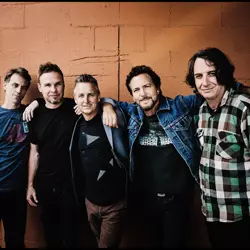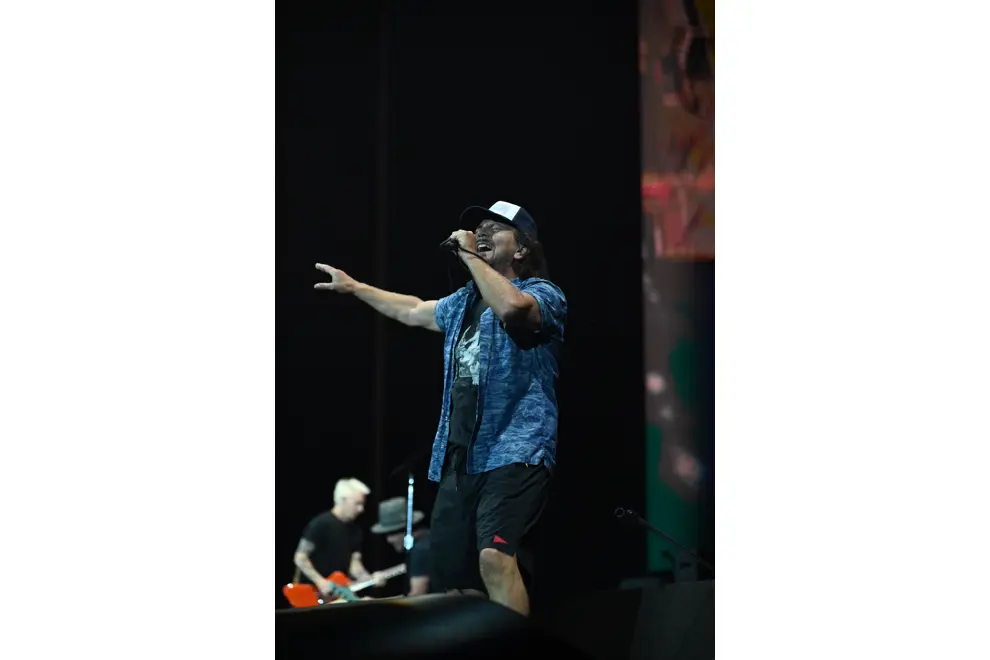 Pearl Jam
Pearl JamThroughout thirty years of interviews, Pearl Jam’s lead singer Eddie Vedder has remained committed to music as a tool for personal salvation. Regardless of what you need saving from, music can do it. For tens of millions of people around the world, few bands could match Pearl Jam's ability to emotionally connect with listeners, and even fewer have their reputation as a live act. Playing live matters a great deal to the band who have released 15 live albums and a collection of 72 “official bootlegs”. Live is where a band who have resolutely fought to remain unaffected by fame can be themselves. It's where the connection is made, and tonight that connection is titanic.
Accompanying their arrival on stage is an oceanic surge of distortion and industrial noise. Within seconds, Matt Cameron's virtuoso drumming is joined by Jeff Ament's crunching bass, and we're suddenly collectively within their 1991 song, Why Go. Eddie Vedder appears on the giant screens on either side of the stage in a trucker cap, waves of shoulder-length dark hair sprouting from its back. On either side of him, guitarists Mike McCready and Stone Gossard engage in seamless interplay, united through to the song's explosive conclusion.
As the cheering fades, Vedder, smile on his face, takes to the microphone. “If you could see what we see now,” he says. “We’re feeling pretty fond of you right now. It’s been a long, hot day, so we want to pace ourselves and check if everyone is doing OK. It’s a lot better than lightning, but it’s really fucking hot," he says, referring to the band's previous Gold Coast show that took place amid torrential storms.
"I’m wearing shorts not to be nostalgic but because it’s really fucking hot.” Vedder, looking as many of his fans did in the early nineties, is wearing knee-length black shorts and a blue short-sleeve shirt over a black t-shirt. With the energy dialled back, Vedder leads the band into Elderly Woman Behind the Counter in a Small Town, which sees an almost ecclesiastical raising of hands and voices in the sold-out stadium: "Hearts and thoughts they fade, fade away."
Don't miss a beat with our FREE daily newsletter
Given to Fly and Hail, Hail follows, but it's the mighty response to Corduroy that evokes what Vedder and the band do best: confessional, personal stories that spark an instinctive response in their fans. Power in the verse, a euphoric soaring in the chorus. When Vedder sings about misanthropy and disdain, it feels transient. When he sings about overcoming the sources of his angst and anxiety and connecting with a deeper understanding or someone else, it feels triumphant.
Likewise, the rest of Pearl Jam have made their livelihoods through direct, live connections with each other, with Vedder, and with the audience. McCready and Gossard’s voluminous chords and piercing riffs connect with the back row. Jeff Ament’s bass remains a bright, taught and fluid muscle of sound. We're here for the music, but we're also here to connect with Vedder.
After a rare outing of an early song, Garden, as requested by a fan Vedder met on the street today, he pauses the set to talk to us again. "Jesus Christ, this is a big show tonight," he laughs. "This… this is not rehearsed," he continues. "It blows our minds that we're here tonight. That we've come half way around the world to play to all of you. We're brothers, we're a team, we love each other, but you've made us be close. So, thank you. It's been just an incredible life, and we wanted you to know. So, thank you so much."
Borne on the goodwill, the Tom Petty-ish Wreckage follows, a highlight from the band’s new album Dark Matter that they’re here to promote. As the cheering continues, the band blast through a new single, the punk-infused head rush of Running, before we're back in the early 90s again with maybe the most distinctive crunching eight-string bass riff of all time, Jeff Ament’s opening to Jeremy.
Phones aloft, voices in union, this is one of the night’s highlights. Vedder leavens the outro with the addition of “My whole life like a picture on a sunny day,” a nod to fellow Pacific Northwesterners Sleater Kinney's song Modern Girl. The cheering that follows amplifies as the opening riff of Even Flow ricochets around the stadium. McCready disappears into the crowd as he plays his long, atmospheric solo. Gossard, bespectacled and appearing to be the band's visual and musical anchor, remains fixed to the spot, grinding through the riffs, clearly on cloud nine. Ament, looking every part the ageing skater turned outdoor enthusiast, paces the stage in activewear and his waist-high pastel pink bass while Cameron miraculously gives the song everything it needs while injecting it with his own personality.
After a short break, Vedder returns to the stage. Trucker cap replaced by a Stetson, he sits on a stool, dons an acoustic guitar and settles in to give a shout-out to his charity, EBRP Australia, a unit devoted to managing and finding a cure for the degenerative skin condition Epidermolysis Bullosa. Some of the researchers are here tonight, and Vedder dedicates Just Breathe to them. Like Wreckage, it is a song where Vedder can relax and not try to sound as he did thirty years ago. Despite the extraordinary talent on stage, Vedder’s voice remains the band’s most powerful instrument, and it is a joy to hear him be able to use it like this.
After the band returns to the stage for Inside Job and Do the Evolution, Vedder takes a moment to notice the younger members of the audience. The camera finds some kids on the shoulders of their parents, and the audience cheers. "Is there a girl here called Evie," Vedder asks. Miraculously, the camera finds her. "Like a needle in a haystack, there she is!" he says as the girl is hoisted into the air, smiling and laughing. "Evie's mom told me this was her first ever concert and that her dad was taking her. Evie, you have a great dad. So, this next song is about an abusive relationship," Vedder begins before catching himself. "Uhhh, this chorus at least, we can dedicate to Evie's dad, you can't find a better man."
With those words, the stadium is on its feet, phones again aloft, bathing the stadium in a sea of white. Even if the song has been played to death on commercial radio over the last 20 years, it still contains a power matched by few others. After the trench run of State of Love and Trust, the opening riff of Alive erupts, and the stadium's house lights burst on and reveal what might be the whitest crowd since Kanye West opened for U2 here in 2006.
The band's renowned cover of Neil Young's Rocking in the Free World begins, and it's clear we're at the tail end of the show now. Guitarist Josh Klinghoffer, taking a completely understandable break from Jane’s Addiction, joins them. Kids are brought up on stage, Vedder throws tambourines out to the crowd, and the house lights illuminate the Oaks Day energy going on in the GA section. This is often where Pearl Jam shows end, but tonight, we get the addition of Yellow Ledbetter, an outtake from the band's first album.
Over the course of tonight’s set, Vedder sings about a lost father, lost love, doubt, deep and lingering regret. He sings about other people’s trauma, obviously, directly, rarely leaning on metaphor or leaving a song open for the listener to piece together its meaning. Vedder has said that he was able to write and sing so directly on Pearl Jam’s first album, Ten, because, as he told journalist Clint Brownlee, “I was protected by the assumption that no one else would ever hear that shit.”
By the time Vedder is lying on stage, exhausted and elated by the end of tonight’s set, a lot of people might have listened to "that shit", but they are still the Seattle band that recorded a demo tape in 1990 that found its way into the hands of a gas station attendant in San Diego who came up with his parts while surfing. As Vedder sings in Scared of Fear, the opening track from Dark Matter and a song we didn't hear tonight: “We used to laugh/We used to sing/We used to dance/We used to believe”. They still do.






















